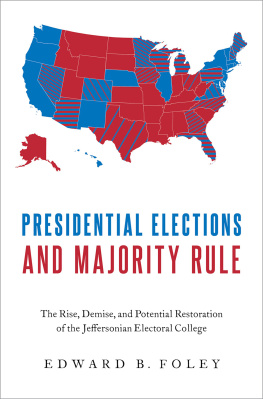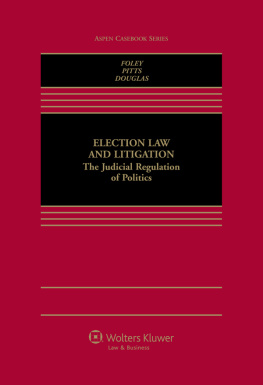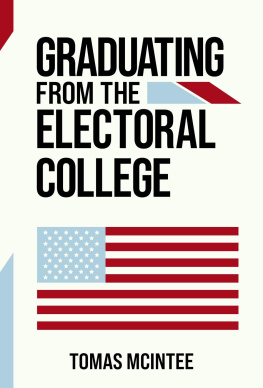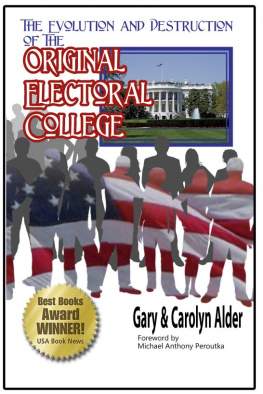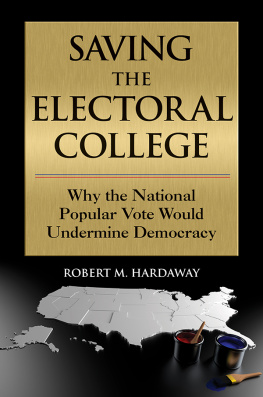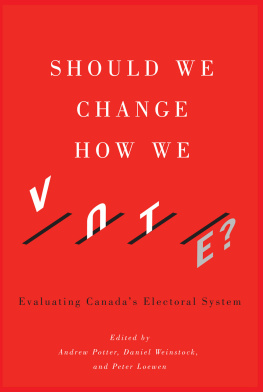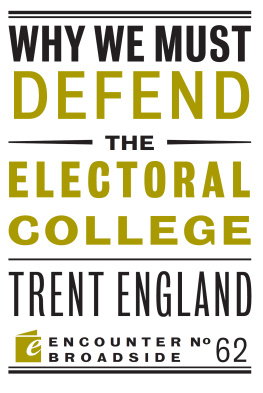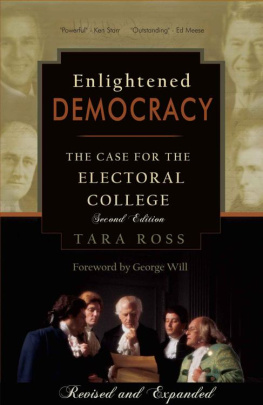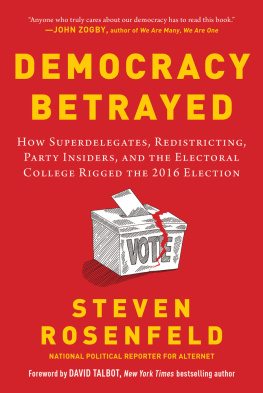Presidential Elections and Majority Rule


Oxford University Press is a department of the University of Oxford. It furthers the Universitys objective of excellence in research, scholarship, and education by publishing worldwide. Oxford is a registered trade mark of Oxford University Press in the UK and certain other countries.
Published in the United States of America by Oxford University Press
198 Madison Avenue, New York, NY 10016, United States of America.
Oxford University Press 2020
All rights reserved. No part of this publication may be reproduced, stored in a retrieval system, or transmitted, in any form or by any means, without the prior permission in writing of Oxford University Press, or as expressly permitted by law, by license, or under terms agreed with the appropriate reproduction rights organization. Inquiries concerning reproduction outside the scope of the above should be sent to the Rights Department, Oxford University Press, at the address above.
You must not circulate this work in any other form and you must impose this same condition on any acquirer.
Library of Congress Cataloging-in-Publication Data
Names: Foley, Edward B., author.
Title: Presidential elections and majority rule : the rise, demise, and
potential restoration of the Jeffersonian electoral college / Edward B. Foley.
Description: New York, NY : Oxford University Press, 2020.
Identifiers: LCCN 2019015756 | ISBN 9780190060152 (hardback) |
ISBN 9780190060169 (updf) | ISBN 9780190060176 (epub)
Subjects: LCSH: PresidentsUnited StatesElections. | Election lawUnited
States. | Electoral collegeUnited States. | BISAC: LAW / Legal History. | HISTORY /
Americas (North, Central, South, West Indies). |
POLITICAL SCIENCE / Government / Comparative.
Classification: LCC KF4910 .F65 2020 | DDC 324.6/3dc23
LC record available at https://lccn.loc.gov/2019015756
For Max and Robbie,
with love and admiration,
and in hope for their future
Contents


this book originated in the classroom. The second unit of the Election Law course, as I teach it, concerns how candidates get on the ballot and the relationship between primary and general elections. Over the last decade or so, as part of our discussion of this topic, my students and I have focused on presidential elections and whether Americas existing system for winnowing the field of many contenders, before the primaries begin, to a single winner in November is a sensible process. Because a couple of the court cases we read concern independent presidential candidates, like John Anderson in 1980 and Ralph Nader in 2000, who have sought the right to be on the general election ballot in November after the party primaries have reduced the field to two major-party nominees, we have considered especially what should be the relationship between the initial narrowing of the primary process and the subsequent addition of third-party and independent candidates. Does America, we ask, use a rational method for choosing its commander-in-chief?
Increasingly concerned that the answer to this question is no, and in anticipation of the 2016 election before it began, I took my interest in this topic out of the classroom and into the library. Fortunate to be invited to a symposium on the law of presidential elections, held at Fordham Law School, I explored methods for managing the role that independent and minor-party candidates can play, even after the two major parties have settled on their nominees. When I began this research, Michael Bloomberg was seriously contemplating an independent bid and easily could have been a major factor in the race. Indeed, precisely because he could not run without tipping the race in a direction he did not prefer, he ultimately declined to enter the contest. His decision made it seem as if the system had escaped from having to cope that year with a three-way race that it was ill equipped to handle.
Then came the results of the 2016 general election. While most everyone else was focused on the fact that Donald Trump won the Electoral College with almost 3 million fewer votes nationally than Hillary Clinton, I was struck by an entirely different statistic: 107 of Trumps Electoral College votes, about one-third of the 304 he received, came from states in which Trump won less than 50 percent of the popular vote. Trump could not reach the 270-vote threshold necessary for an Electoral College victory without at least some of these sub50 percent states. Although Bloomberg had decided not to run, it turned out that additional candidates besides Trump and Clinton played a role in the race. My concern was not proving whether Trump or Clinton would have won if these other candidates had not been on the ballot. Rather, what worried me was that the 2016 election demonstrated that Americas system for electing presidents is incapable of including independent and third-party candidates on the November general election ballot without the significant risk that their presence will alter which major-party candidate prevails. Moreover, as 2016 also showed, this significant risk exists even when each of the extra candidates receives only a very small percentage of the vote (below 5 percent).
Given this troubling assessment of what happened in 2016, it seemed necessary to revisit the initial research I had undertaken for the Fordham symposium and to analyze the issue more systematically. Starting with the goal of finding a policy solution in the political science literature on alternative voting systems, the project quickly took a historical turn. Knowing that the Twelfth Amendment (the part of the Constitution establishing the Electoral College system that operates today) requires that a candidate win a majority of Electoral College votes in order to be president, I was curious what the authors of the Twelfth Amendment would have thought of the sub50 percent wins that Trump used to achieve his Electoral College majority. I had no idea what I would find.
I was absolutely amazed to discover how deeply and extensively the authors of the Twelfth Amendment thought about implementing a fundamental commitment to majority rule in the specific context of electing the chief executive of a federated republic. In the course of conducting this research, I also realized just how important it is to recognize that the Electoral College in the Twelfth Amendment rests on an entirely different animating philosophy than the Electoral College that was the product of the Constitutional Convention in 1787. This innovative vision was fully articulated and thoroughly deliberated in the debates that led to the adoption of the Twelfth Amendment. Yet knowledge of this innovation has largely disappeared.
Having unexpectedly discovered the rich philosophical discourse underlying the Twelfth Amendment, I also wanted to understand why and how Americas knowledge of this crucial component of its constitutional system essentially vanished. That disappearance is another historical story, one that takes place over the course of the nineteenth and twentieth centuries. Figuring out this story required considerable additional research and led to more unexpected discoveries, like the largely unrecognized significance of the 1844 election, or how Lincolns victory in 1860 should be understood as the Twelfth Amendment working as intended, not as an errant outcome. It became the purpose of this book to convey the totality of the history relevant for understanding how America has a system that can produce an Electoral College majority based on sub50 percent victories in pivotal states.

